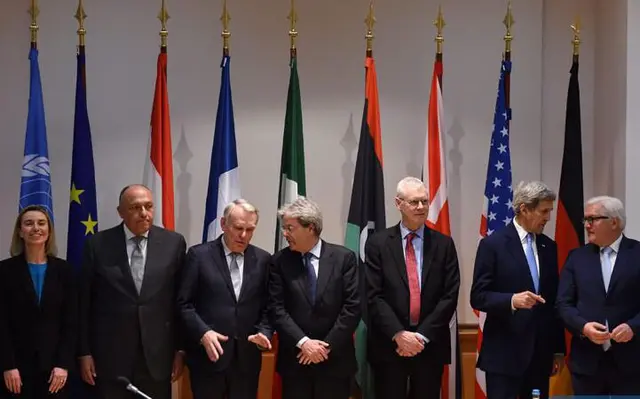As the annual Munich Security Conference (MSC) enters its third day on Sunday, the United States and Russia continue to exchange strong words and accusations over the world's major predicaments that are posing a grave threat to global security.
The persistent rifts between the two rival powers have re-emerged, as Russia casts a skeptical eye on a Syria ceasefire agreement, while the United States accuses Russia of hitting the wrong targets and urges the country to respect the deal.
The truce, or a temporary "cessation of hostilities," was agreed Friday among five world powers, namely the United States, Russia, Turkey, Iran and Saudi Arabia, and was planned to take effect within a week.
Speaking at the MSC on Saturday, Russian Foreign Minister Sergey Lavrov put the chance of implementing the truce at 49 out of 100 percent, indicating that Russia remains suspicious of U.S. intentions.
Also on Saturday, Russian Prime Minister Dmitry Medvedev rejected allegations raised earlier by his French counterpart Manuel Valls that Russian forces have bombed civilians in Syria, saying there has been no evidence so far.
"No one has presented any evidence on the bombing of civilian population so far, even though we have been accused of it all the time," Medvedev told the MSC.
For his part, U.S. Secretary of State John Kerry repeated accusations that Russia's attacks have been against "legitimate opposition groups" backed by the United States and its European and Arab allies. He called on Russia to change its tactics to ensure the ceasefire agreement be carried out on time.
"To adhere to the agreement it made, we think it is critical that Russia's targeting change," Kerry said. "If people who want to be part of the conversation are being bombed, we're not going to have much of a process."
Yet the prospect of a ceasefire actually taking place in the war-torn country seems gloomy, as Syrian government forces Saturday captured another village near the rebel-held eastern half of Aleppo amid new rounds of Russian airstrikes, according to the Britain-based Syrian Observatory for Human Rights.
Further complicating the situation, Turkey and Saudi Arabia, both U.S. allies, could launch a ground operation in Syria against the Islamic State (IS) militant group, according to Turkish Foreign Minister Mevlut Cavusoglu.
"If there will be a comprehensive strategy within the scope of fight against IS, we all said that Turkey and Saudi Arabia could launch a ground operation," the minister was quoted by Turkey's Haberturk daily as saying after attending the MSC.
International efforts to grapple with the ongoing Ukrainian crisis have also been shrouded in doubts and concerns, as unhealed rifts between Russia and the United States have caused major obstacles to turn commitments on paper into reality on the ground.
Kerry on Saturday urged Russia to fully implement the Ukraine peace agreement reached in Belarus'capital Minsk last year. Otherwise, sanctions from the United States and the European Union against Russia would stay in force.
"I am confident that Europe and the United States are going to continue to stand united, both in sustaining sanctions for as long as they are necessary, and in providing needed assistance to Ukraine until the sovereignty and integrity of Ukraine is protected through the full implementation of the Minsk agreements," Kerry told the MSC.
Earlier on Friday, Ukraine's President Petro Poroshenko, who made very emotional remarks on the Ukrainian conflict in a panel discussion, accused Russian troops of having "occupied" his country.
Medvedev, in his earlier statement, accused Kiev of breaching the Minsk deal because Kiev did not change Ukraine's constitution to grant special status to eastern Ukraine.
He also said that Kiev has tried to shift the blame onto Moscow for the continued shelling in the area now under rebel control.
The Russian prime minister stressed that the Minsk agreement is "the best way to solve the crisis in Ukraine" and "should be followed by all sides."
The prime minister admitted the controversies between the West and Russia, but also struck a positive note, saying that "our positions differ, but they do not differ as much as 40 years ago when a wall was standing in Europe."
Earlier Friday, a consensus to ease Syria's humanitarian plight was reached in the temporary truce deal, as relevant countries agreed to "accelerate and expand" deliveries of humanitarian aid to besieged Syrian communities beginning this week.
Regarding the military cooperation between the United States and Russia, Lavrov said Saturday that it is "the key tool" to ensure the delivery of humanitarian supplies and an end to hostilities in Syria.
"If we are moving closer to practical goals of (a) truce, then without cooperation between the military nothing will work out," Lavrov said.
MSC chairman Wolfang Ischinger on Saturday also called on leaders of both Russia and Western countries to move toward a compromise to ease tensions and resume constructive dialogues.
"A compromise is not a one-way street, so everybody, all players need to move, that is what we are hoping to achieve here," he said. Enditem
 简体中文
简体中文

